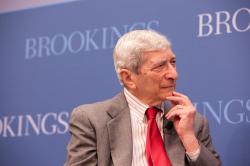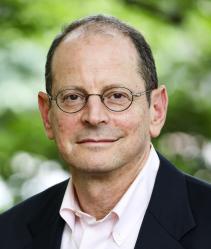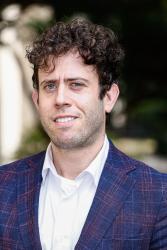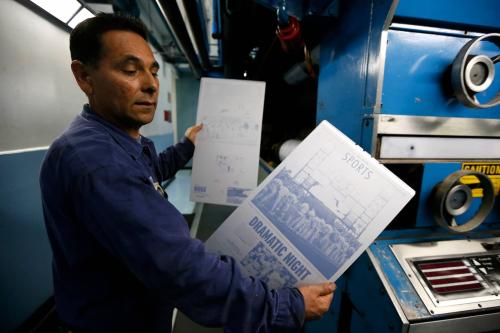In honor of the United Nations World Press Freedom Day on May 3, former and current journalists in the Brookings community weighed in on the importance of a free press, threats facing journalists in the U.S. and abroad, and what the rise of “fake news” means for the future of journalism.
|
Kalb is a Nonresident Senior Fellow in Foreign Policy, and a former Moscow bureau chief and chief diplomatic correspondent for CBS and NBC, professor of journalism at Harvard University and the George Washington University.
The concept of a free press was written into the First Amendment of the U.S. Constitution. It was of fundamental importance then, and now. It confirms the importance of a “fourth branch of government” to talk truth to the power positions of the other three branches. Otherwise, they run the risk of believing their own nonsense, and the concept of a democratic system of government begins to weaken and ultimately wither away.
I view the President’s repeated criticisms of the press, his humiliating of journalists, his emphasis on “fake news”, his attacks on the press as the “enemy of the people,” his undervaluing of the press’s importance in a democracy, as signs of danger to our freedom. It could be that his bark is louder and more threatening than his bite, but I do not want to run the risk of losing everything because I misjudged his intent. [Today] the press must be even more careful about its fact base, scrupulous in its commitment to fact-based journalism, and mark clearly that which is fact from that which is opinion. |
|
Rauch is a Senior Fellow in Governance Studies, and a career journalist trained in the newsrooms of the Winston-Salem Journal (North Carolina) and National Journal magazine. He has been writing for The Atlantic since 1989, and has written numerous books and articles for commercial media outlets.
There is a reason that the First Amendment is first. And that Jefferson said, “Were it left to me to decide whether we should have a government without newspapers, or newspapers without a government, I should not hesitate a moment to prefer the latter.” A free press brings to light and disseminates the information that informs the electorate and holds powerful people and institutions accountable. It shows where society’s problems are, even when some might prefer to look away. It is the first-line defense of free speech for everybody. Of course, journalism has its shares of flaws and problems, like any human endeavor, but the Washington Post is right: Democracy dies in darkness.
In many foreign countries, government censorship and intimidation are the leading dangers to press freedom. In the United States, fortunately, censorship is not an option (thanks to the Constitution) and intimidation does not seem to be working (President Trump’s rhetorical attacks on the media seem, if anything, to have rallied support behind the outlets he threatens). Here at home, two other aspects worry me more. One is the demolition of the ad-supported model for reported journalism, which is denuding newsrooms of the bodies and brains they need to cover core institutions like state legislatures.
The other is the cratering of public confidence in mainstream journalism–a phenomenon caused in large part by four decades’ worth of relentless media-bashing by politicians and activists who have agendas of their own. Fostering antagonism toward the media diminishes support for press freedom and, what is just as worrisome, fuels public cynicism about the very possibility of journalistic integrity.
|
|
Wessel is a Senior Fellow in Economic Studies and the Director of the Hutchins Center on Fiscal and Monetary Policy. He served as a journalist for more than 35 years before joining Brookings, including 30 years on the staff of the Wall Street Journal, where he remains a contributing correspondent. Wessel also appears frequently on NPR’s Morning Edition.
A free press is important because it is an essential ingredient in a democracy. The press, when it does what it should, speaks truth to power. It is a check on corruption, excesses, and stupidity in government and in business.
Globally, I think the biggest threat to a free and independent press is the frightening number of journalists who have been killed in imprisoned around the world. In the U.S., I think it’s the evaporation of the business model that sustained our great newspapers for decades…and the Trump administration’s hostility towards the First Amendment. |
|
Dionne is a Governance Studies Senior Fellow, a syndicated columnist for the Washington Post, and university professor in the Foundations of Democracy and Culture at Georgetown University. A nationally known and respected commentator on politics, Dionne appears weekly on National Public Radio and regularly on MSNBC.
A free press is vital to freedom, democracy and the struggle against corruption. As the historian Timothy Snyder said, ‘If nothing is true, then no one can criticize power, because there is no basis upon which to do so.’ Autocrats know this, and free citizens should remember it. |
|
A visiting fellow in Foreign Policy, Kirchick began his professional journalism career at The New Republic. He has also served as the writer-at-large at Radio Free Europe/Radio Liberty based in Prague and continues to write for a wide variety of publications.
A free press is important because it is the freedom upon which all of our other freedoms are contingent. Today, the greatest threats to free and independent media are authoritarian governments that censor, imprison, and occasionally murder journalists.
“Fake news” — a euphemism really for false information — has existed as long as there has been a news media. What’s changed is how capriciously this accusation is thrown by everyone from the President of the United States on down to describe “news I don’t like.” Over time, the de-legitimization of traditional media sources will have a corrosive effect on our democracy as citizens will no longer agree to a common set of facts. |







Commentary
On World Press Freedom Day, Brookings experts reflect on the importance of a free press
Thursday, May 3, 2018